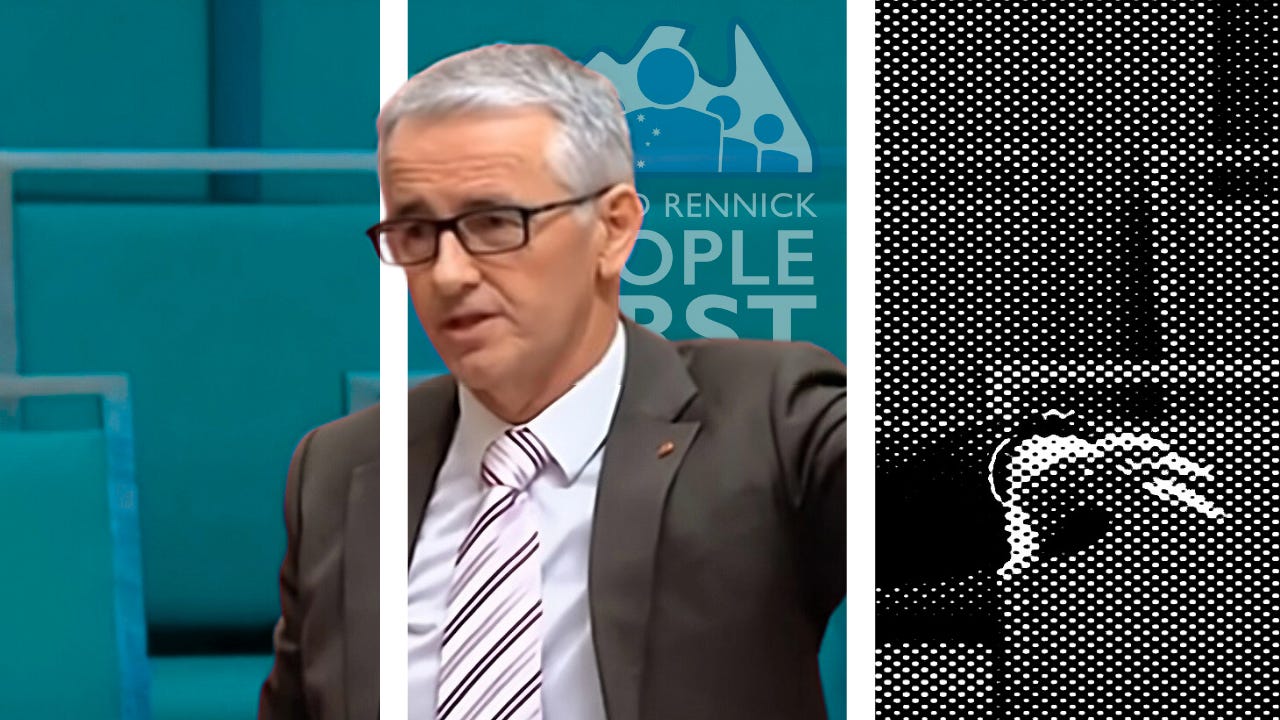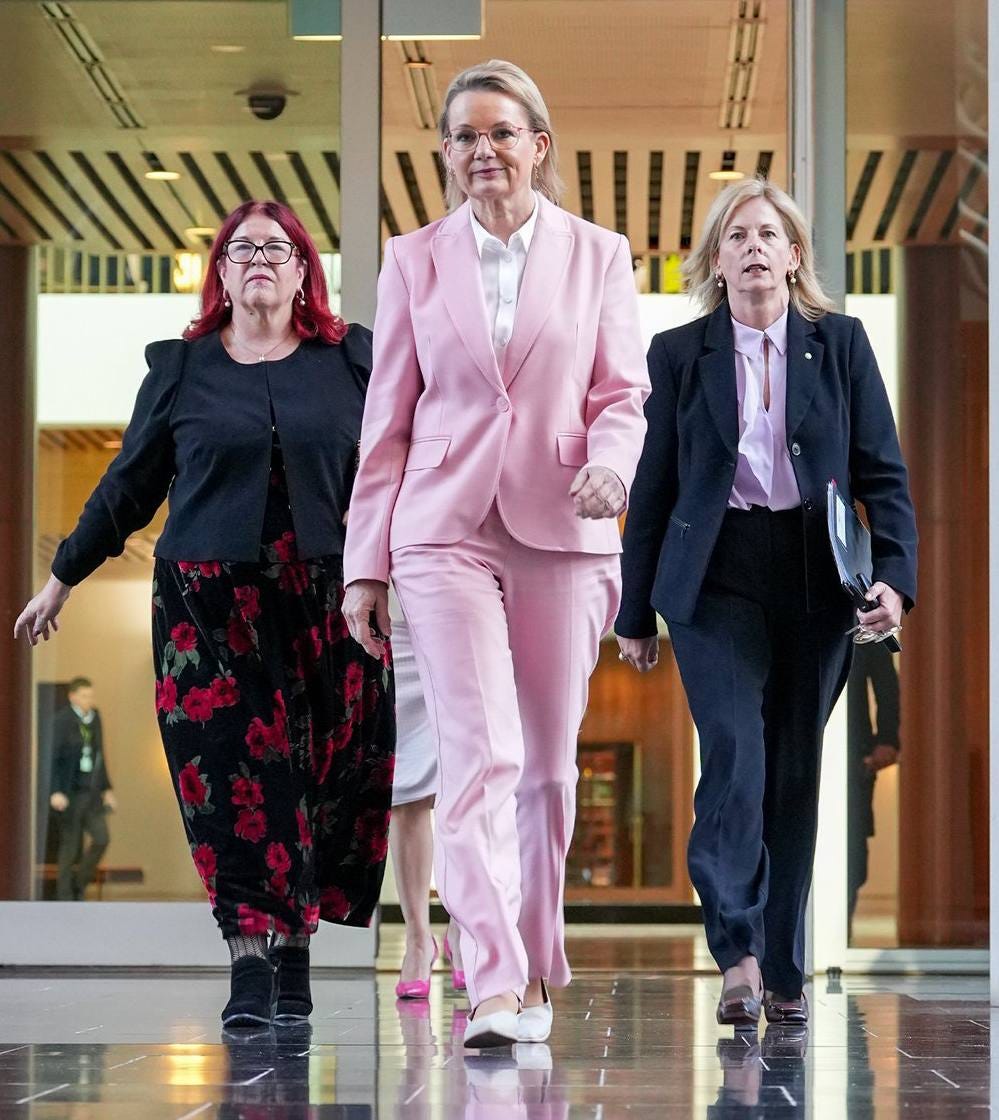Article by Jo Gullett, find more of his content @ColonistSettler on 𝕏
If you’re reading this there’s a good chance you’ve listened to the latest National Observer podcast which featured an interview with ex-Senator Gerard Rennick, founder and leader of the People First Party.
For many of us, Rennick was a breath of fresh air. Entering Parliament initially as a Queensland LNP Senator, he soon had himself on the outer with senior Party leaders for his uncompromising stance on issues like the safety and efficacy of the rushed COVID vaccines and the politicised efforts of the BOM to hype up climate change hysteria.
Now while the fervour and rigour with which he went after these issues separated him from many of his Liberal Party colleagues in Parliament, there were other things of particular interest to nationalists beyond these more ‘standard’ enthusiasms of the Liberal Party right, primarily those emanating from his old-school protectionist economic standpoints.
Whether criticising ex-PM Paul Keating for introducing neoliberalism into Australia, advocating for a public banking option, or expressing his fondness for the Queensland Caudillo Joh Bjelke-Petersen, there was a vibe from Gerard that was quite different from, say, an Alex Antic.
Here was a man that seemingly had a vision that centred the nation as such, recognising that its welfare was threatened not just by overweening government, but also a rootless and cartelised private sector.
Having through his outspokenness made himself untouchable with Liberal Party powerbrokers, he was, in murky circumstances, denied pre-selection for a winnable spot on the 2025 Queensland Senate ticket. Realising the futility of continuing to ‘play the game’ within the LNP, Gerard burnt his ships and launched the People First Party.
Encouragingly, the new party went into the election with the strongest platform on immigration reduction of any party with a realistic shot of winning office, and, for a party with effectively no media support and no big donors, did admirably well, with Rennick himself winning over 5% of the Queensland first preference vote and for a time seeming to threaten the spot of One Nation Senator Malcolm Roberts.
Alas, preference flows meant it was not to be, but Rennick didn’t give up. He promised to struggle on with People First, building it into a party with the genuine internal democratic input missing from both the Liberals and One Nation.
The opportunity this offered to the nationalist right to get involved with a vehicle that posited a strong immigration reduction platform, a holistic nationalist economic program AND a seemingly genuine goal to build a party that through its vitality and intelligence could unite not just the minor party right but even threaten the stranglehold of the LNP was enticing. No longer would our membership fees go to funding the inclinations and lifestyles of a Christopher Pyne or a James Ashby!
But then it all came crashing down with Tuesday’s Backbench Drivers podcast. Rennick said People First was a pro-immigration party. He said we can’t be seen to be “bashing migrants”. He blamed misbehaviour from Muslims in Australia on neocon foreign policy decisions. He even said he didn’t like some of our banter on Twitter… say it ain’t so Gerard! IT’S OVER.
But is it?
Despite these comments I think that Australian nationalists should not throw out the baby with the bathwater. Politics is more than surface-level rhetoric, and People First may still have a structural utility for nationalist ends that cannot be replicated in any other party.
Surveying the Landscape:
The Libs
If we go back as little as twelve months ago, I am somewhat ashamed to say I thought the Liberal Party held some promise. In a previous article I wrote about how the Voice referendum showed the way to an enduring anti-globalist majority for the Liberal-National Coalition – if they wanted it. Even into the start of 2024 things looked promising. Dutton as Opposition Leader had promised reductions in net overseas immigration, breaking a taboo not breached since Tony Abbott did so (very briefly) in the leadup to the 2013 election. The polls were rewarding Dutton accordingly.
The history is well-known from there: The backdown from the immigration promise, the cargo-culted lifting of the chintziest MAGA policies, the botched election campaign and, most of all, the inability of Dutton as Party leader to stand up for right-wing members of the Coalition such as Ben Britton (after he failed to help Rennick in his pre-selection) put paid to that thesis. Mea culpa. Unsurprisingly, lacking both spine and vision, the Liberals were pummelled at the election by a more disciplined Labor outfit.
The election loss has left the Liberal Party Right in a precarious position. The disappointment of the campaign (including the huge effort put into winning back Teal seats for minimal gain) has caused many members of the Party to resign. The factional Left is on top in Victoria, Queensland and, likely, New South Wales. Tassie and NT are largely inconsequential (sorry guys) and the WA party is a rump, unlikely to recover. The only state division of any significance which is firmly controlled by the Right is South Australia, but even there, Senator Antic’s reign is of a more Pentecostal Christian flavour, unsatisfying to many nationalists.
New Opposition Leader Susssssssan Ley now enacts her pantsuit regime, moving the Party leftwards in search of (^◦^)aspirational(^◦^) voters, under the watchful gaze of Alex Hawke, a man who would make a literal hollow suit seem substantial.
But there is a reaction. Old warhorses Tony Abbott and John Anderson are engaged in an effort to rehabilitate the Liberal Right, scouting out talent over lunches at various private clubs and conservative societies, trying to recast classical liberalism for a new age of sub-altern ethnic conflict – Tony has even been heard testing out the term ‘Anglo-Celtic’. Can we expect Frank Salter to get a tap on the shoulder to run for the Libs at the next federal election? Don’t count on it.
The Liberals will increasingly make use of sounds of a ‘based’ nature to try and contain the growing energy of the youth right, but there will be no policy follow-through. The path to a nationalist Liberal Party has been tried, and it has failed and no amount of Danube Institute conferences will change that.
The great danger of the Liberal Party is that they are structurally incapable of being a nationalist party due to their ties to anti-national funding sources, but they still have the reach to stymie the development of any genuinely nationalist forces to their right.
One Nation
Despite their own lethargy and ineptitude, One Nation improved their results in the election, winning back Malcolm Roberts’ Senate seat and just squeaking in two more Senators in NSW and WA, bringing their total to four members of the upper house, once you include the off-cycle party leader, Pauline Hanson. This was One Nation’s best result since the double dissolution election in 2016.
In the circumstance though, this can’t be seen as anything other than a disappointment. With a historically unpopular Labor government crushing Australia with a tidal wave of foreigners and a spasmodic Liberal Party that couldn’t seem to get anything right, to have only gained 6.4% of the national vote is an indictment.
The reasons for this failure would be familiar to any seasoned observer of right wing politics in Australia: lack of campaigning, lack of on-the-ground support and, in many cases, lack of a credible local candidate. In short, the same pitfalls of any party focused only on winning a sinecure Senate seat for a dictatorial party leader while running paper candidates to hoover up the votes of disaffected but low-information voters and milk public funding, all to be sent back up to Queensland HQ for who-knows-what.
Post-election, One Nation have promised to establish a branch network (clearly in response to the threat of People First). There are now two ‘pilot’ branches! We’ve seen this movie before… this party ‘democracy’ will only continue as long as it keeps the party under tight reins and the coffers controlled by Hanson and Ashby full.
Where to now?
So to come full circle, it is clear that in order to open space for a genuine nationalist right option, the Liberal Right can not be allowed to regather and recuperate identitarian energy, and One Nation must be destroyed entirely. The question remains: Is People First the right vehicle to do this, even with the recent comments of party leader Gerard Rennick?
I must answer in the affirmative. The kind of person who votes or volunteers for the Liberal Party Right is not ideologically well-formed, and all sorts of submerged liberal ideas will cause them to be spooked by an appeal of any kind of strongly identitarian nature. This is changing, and the metapolitical winds are blowing in an identitarian direction, but the time is not now for that kind of party.
The most important thing is to threaten the Liberal Right and One Nation with a professional and friendly appeal that speaks for the nation in the way most Australians still understand it: a civic identity with an understated but non-exclusive ethnic homogeneity underpinning it, and a focus on bread-and-butter economic issue to which mass immigration is the key detriment.
This is all very obviously based upon the ‘optics-cucking’ side of that perennial nationalist debate, but this is necessary to achieve the structural realignment proposed above – we must break the Liberal-National-PHON cartel to allow new perspectives in, and to do that requires a degree of pragmatism that will not satisfy purists. To take enough power, and disrupt our ideological enemies enough to reframe the debate around the good of the nation even if the composition of that nation is overly-broadly construed is necessary AND achievable.
People First’s immigration policies leave plenty of room for the working out of details by young, dedicated activists with a long term view. The only real line-in-the-sand that Rennick continually mentions is the “100,000 visas”. This by itself amounts to net negative migration… better than promised by any other party. Remove the pathway to citizenship, perhaps some kind of bureaucratic overlay for ‘cultural compatibility’ in the selection phase… all of a sudden you’re looking at a program that is far, far more rigorous than anything taken to an Australian electorate in a long time, all still wrapped up in nice-guy packaging.
We often look overseas and ask “when will WE get our based populist party?” but people forget that the most successful European populist parties are, in the main, civic nationalist parties: The Sweden Democrats, French National Front, and Germany’s AfD are all based around a civic conception of nationhood. The latter has a lesbian leader with a Sri Lankan ‘wife’!
It’s good to take stock, to reassess our options in a time of flux, but don’t get spooked by rhetoric that doesn’t entirely line up with your own preferences. Think about the structural requirements of the next political moment and I hope you’ll see that People First and Gerard Rennick are not to be written off just yet.






The timeframe needs to be more ambitious - the country will be lost and not salvageable in 10 years time... we'll have become a one party state, like ChyNah is - everyone and everything tightly controlled and constantly surveilled.
Globalists will just use our people & resources as their playthings in their quest to realise their 'choseness'.